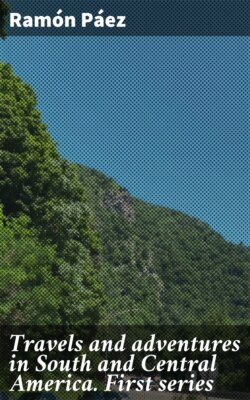Читать книгу Travels and adventures in South and Central America. First series - Ramón Páez - Страница 11
На сайте Литреса книга снята с продажи.
ОглавлениеEven this was considered a great luxury at San Pablo, few other cattle-farms being provided with the necessary utensils for its manufacture, and still fewer the number of those that will grow sufficient corn for the consumption of their inmates. The Llaneros are essentially a pastoral people, and trouble themselves but little with the cultivation of the land, considering it rather derogatory to bend their heads, even to mother Earth. Hence their homes are usually in a state of utter wretchedness, being unprovided even with the commonest necessaries. Although the land is extremely fertile, and would well repay the labor with abundant crops of every kind of grain, they do not consider bread an essential, using instead a piece of boiled liver, which in their estimation answers just as well. Therefore the divine command, which enjoins us to earn our daily bread by the sweat of the brow, is not much regarded by them. In the midst of countless herds, and surrounded with the most munificent gifts of a bountiful Providence, they are often even without fresh meat; not because they are sparing of their cattle, which in that country bears a nominal value, but because they are naturally abstemious; and as for milk and butter, they despise both as food only fit for children. Cheese, however, is a favorite article of food with them, and in its preparation, they display considerable ability, especially the delicious kind termed queso de manos, a species of boiled cheese. As some of my readers may wish to experiment in making it, I will give them the recipe. Curd the milk in the usual way, and boil the curd in its own whey. When about the consistency of molasses candy, stretch it out repeatedly with the hands until cold. Add a little salt to the mass; roll it into flat cakes, and hang the cheese to drain in nets suspended from the ceiling. When pulled, it will separate in layers which look like parchment, retaining all the flavor of the milk.
The cows, being half wild in most cases, require to be milked by main force. To accomplish this, one of the dairymen throws a noose around the horns of the animal, and holds it secure by means of a long pole attached to the thong, while another proceeds to milk it in the usual way; but none will yield a drop, unless the calf is first allowed to suck a little, and then tied to the mother’s knee.
Every cow is distinguished by a fancy name, such as Clavellina, Flor del Campo, Marabilla, and others equally euphonious and poetical. When called to be milked, the tame ones immediately answer in suppressed bellowings, and come forward of their own accord, while the calves confined in the pen, on hearing their mothers’ names, run along the fence in search of the gate; a boy, stationed there for the purpose, lets fall one of the bars, and off they bound after the mothers.
The men perform there altogether the occupations allotted to women in other countries, such as milking the cows, curding the milk, and turning out the cheese when ready. They do not even disdain cooking their own food, and washing their own garments, when occasion requires. Of the women, I may be permitted to quote here what Sir Francis Head, in his quaint style, says with reference to those in the Pampas of Buenos Ayres, as being equally applicable to their sisters of the Llanos: “The habits of the women are very curious: they have literally nothing to do, the great plains which surround them offer no motive to work, they seldom ride, and their lives certainly are very indolent and inactive. They all have families, however, whether married or not; and once when I inquired of a young woman employed in nursing a very pretty child, who was the father of the ‘criatura,’ she replied ‘Quien sabe?’ ”[20]
But it is time to introduce my reader to a more intimate acquaintance with this singular race of people, whose manliness, bravery, and skill in waging a constant war, not only with the wild animals of the field, but against the proud legions of Iberia, entitle them to a place among the heroes of the earth.
